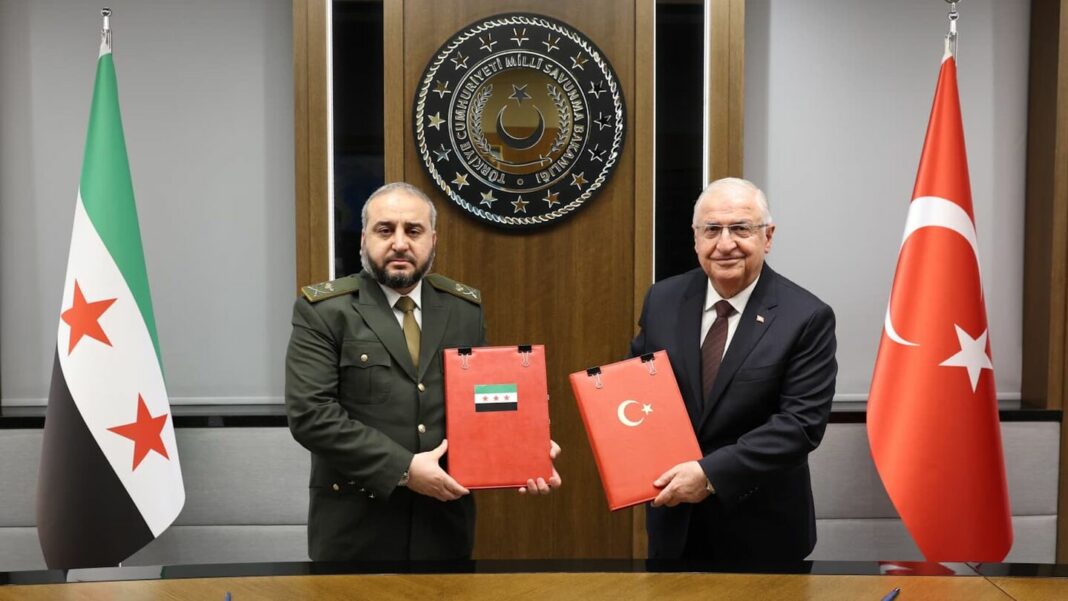The military agreement comes amid Ankara’s warnings to the Pentagon-allied and Kurdish-led Syrian Democratic Forces over their refusal to integrate into Syria’s army.
ANKARA — Turkey and Syria signed a long-anticipated military cooperation agreement in Ankara Wednesday for military training and assistance.
The memorandum of understanding was signed by Turkish Defense Minister Yasar Guler and his Syrian counterpart, Murhaf Abu Qasra, the Turkish Defense Ministry said in a statement.
Qasra was in Ankara along with Syrian Foreign Minister Asaad al-Shibani as well as Syrian intelligence chief Anas Khattab.
While the Turkish side didn’t release any details on the content of the agreement, Syria’s state-run Sana News Agency reported that the deal includes the exchange of military personnel for specialized training, technical assistance and programs in areas such as counterterrorism, mine clearance, cyber defense, military engineering, logistics and peacekeeping.
It also aims to enhance the capabilities of the Syrian Arab Army, support security sector reform and develop its institutions and structure, SANA reported.
Ankara and its regional ally Damascus have been negotiating a military cooperation deal in the aftermath of the fall of the Assad regime last December. It will likely allow Turkey to transfer military equipment to Syria and possibly deploy Turkish troops to an unspecified military base in Syria. A Turkish Defense Ministry official said in April that discussions between Ankara and Damascus on establishing a military base in Syria to train Syrian troops were ongoing.(emphasised by observatoireturquie.fr)
Turkey already has an estimated 10,000 troops in the country, primarily deployed in northern Syria, but a potential Turkish presence in southern Syria led to tensions between Turkey and Israel in April, when the Jewish state struck several military sites in the war-ravaged country, including the strategic T4 base, where Ankara was reportedly preparing to station Turkish drones.
The Israeli side said that additional Turkish military deployment at the T4 base in Palmyra would be a red line, Israeli officials said at the time.
Following the Israeli strikes, the two sides also set up a hot line to prevent mishaps between the countries’ militaries in Syria.
The military cooperation agreement comes as Ankara escalates its rhetoric against the Pentagon-allied and Kurdish-led Syrian Democratic Forces over the latter’s refusal to lay down arms and fully integrate into the Syrian military. The SDF has expressed concern that a loss of autonomy would leave the group open to attacks from Islamist groups operating under Syrian President Ahmed al-Sharaa.
Turkish Foreign Minister Hakan Fidan on Wednesday accused the SDF of relying on Israel’s backing to sustain an armed presence in northeastern Syria, citing Israeli intervention there.
Fidan said that the presence of a “weak” central government in Syria “appears to have become a priority factor in Israel’s national security assessments.”
Israel has conducted hundreds of airstrikes on Syrian military facilities since the fall of the Syrian regime. Its strikes resumed in July following violence in the southern Syrian city of Suwayda between Sunni Bedouin tribes and the government forces that back them and the Druze minority that claimed more than 1,000 lives. Israel cited ties to the Syrian Druze community and its own Druze minority as justification for its intervention.
“Do you intend to turn our Syrian Kurdish brethren into a pawn of Israel?” Fidan said at a joint presser with his Syrian counterpart.
Fidan’s remarks came less than a week after his trip to Damascus last Thursday amid increasing efforts by the United States as well as Turkey to compel the SDF to fully integrate into the Syrian state forces.
On Tuesday, a tripartite meeting in Amman brought together Shibani, Jordanian Foreign Minister Ayman Safadi and US special envoy to Syria Tom Barrack to discuss developments in Syria. The same day, the SDF dispatched a delegation to Damascus to resume talks with the Sharaa administration on integration, Al-Monitor reported, citing sources familiar with the matter.
Ankara deems the SDF a top national security threat, as its backbone militia, the People’s Protection Units, is an offshoot of the outlawed Kurdistan Workers Party (PKK). The PKK declared its intention to lay down arms and disband in May as part of ongoing peace talks between the Turkish government and the militant group.
Ankara expects the SDF to lay down arms as part of a process to integrate its fighters into the Syrian military, viewing it as a key step for the success of the ongoing peace talks with the PKK.
“We are seeing developments that we are finding increasingly difficult to tolerate,” Fidan said, echoing Ankara’s previous warning that it could intervene militarily in Syria. Fidan said last month that Ankara would view any attempt by the SDF to divide Syria as a national security threat and take action.

